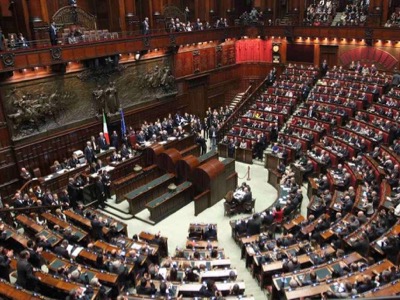Nato has rejected nuclear disarmament and the Italian Parliament has effectively ratified this decision. The Italian Parliament did so by resorting to a fairy tale of a transatlantic alliance where each member has an equal say. This story-telling is divorced from reality as in 2011, Nato did not simply overreach the terms of a UN resolution when it attacked Libya to secure a regime change, it also violated its own statutes by failing to convene the North Atlantic Council to obtain the go-ahead. The conclusion has to be that the idea that this Council could pre-empt the Alliance transforming into an imperialist venture is a deceit known by all its members.

19 September, the day before the Treaty on the Prohibition on Nuclear Arms had opened for signature in the United Nations: the House of Representatives [“Camera dei deputati”], approves by a large majority (296 against 72 and 56 abstentions) a Partito democratico [Pd] motion signed by Moscatt and others. This motion will bind the government to:
• “continue to pursue the aim of a world rid of nuclear weapons through the vehicle of the Non Proliferation Treaty (NPT)
• assess whether the possibility of becoming a party to the Treaty to ban nuclear weapons, approved by the UN General Assembly is compatible with Italy’s obligations as a member of Nato.
The Pd motion “on which the government has expressed a favourable opinion” is a smokescreen hiding the fact that Italy is now happy to tap its foot in time to the rhythmical increase of USA/Nato nuclear weapons, by hosting, in complete violation of the NPT, US B-61 nuclear bombs that from 2020 will be replaced by the B61-12 bombs which are even more dangerous.
The real position of the Gentiloni government only emerged the following day when, through the North Atlantic Council, to which Italy belongs with the other 28 governments of Nato states, it completely rejected and attacked the UN treaty [1]. The parties that voted for the PD motion in the House of Representatives were: Forza Italia, Fratelli d’Italia, Scelta Civica, Alternativa Popolare, Democrazia Solidale and Gruppo Misto. The Lega Nord, absent from the Chamber at the time of voting, made its own motion calling on the government “not to give up the guarantee offered by the US’s readiness to protect Europe and our own country, with nuclear weapons if necessary, though not necessarily pointed at Russia”. As if Italy were capable of establishing which sovereign state the US nuclear weapons must point their nuclear warheads at.
The Italian Left and Article 1, in their motions, both of which were rejected by the House, made two identical requests:
– 1. in reliance on the NPT, US nuclear weapons must be removed from Italy; and
– 2. Italy must become a party to the UN Treaty.
However, neither the Italian Left nor Article 1 voted against the PD motion, preferring instead to abstain from voting. In sharp contrast, the Movimento 5 Stelle voted against the PD motion. Yet, its motion, which was also rejected, refrained from chorusing the request (the legal basis for which lies in the NPT) for the government to remove the US nuclear weapons from Italy. Nor either did the motion ask for Italy to become a party to the UN Treaty. Its resolution was a call to:
• “report to Parliament on the presence of nuclear weapons in Italy, and stop shielding itself with a non-existent Atlantic secrecy pact which US citizens and parliamentarians do not comply with” and
• “declare that Italy is not willing to use nuclear weapons, nor even to purchase the necessary components to make the F-35 airplanes suitable for transporting nuclear weapons”.
The motion of M5S reflects Luigi Di Maio, the aspiring Premier’s position:
• “we do not want to leave Nato” (as he declared last April in a conference held in the US); and
• “we want to stay in Nato, but we want to democratize a large part of the choices” (as he declared in an interview last June).
Illusion or worse. In the North Atlantic Council, according to Nato norms, decisions are taken “not by vote nor by majority decision-making. Instead “decisions are taken unanimously and by consensus”. This equates to decisions being taken by the US which is automatically allotted the office of the Supreme Allied Commander of Europe and the other key commands, including Nato’s Nuclear Planning Group. To promise that the F-35 planes, conceived for nuclear attack especially with the B61-12, can be used by Italy with a kind of security that use of nuclear arms prevents, is tantamount to a fairy tale you’d tell to children to put them to sleep, undisturbed by nightmares.
[1] Source : “North Atlantic Council Statement on the Treaty on the Prohibition of Nuclear Weapons”, Voltaire Network, 20 September 2017. Analysis : “A Nato attack on Nuclear Disarmament”, by Manlio Dinucci, Translation Anoosha Boralessa, Il Manifesto (Italy) , Voltaire Network, 26 September 2017.

 Articles by this author
Articles by this author Send a message
Send a message
















Stay In Touch
Follow us on social networks
Subscribe to weekly newsletter